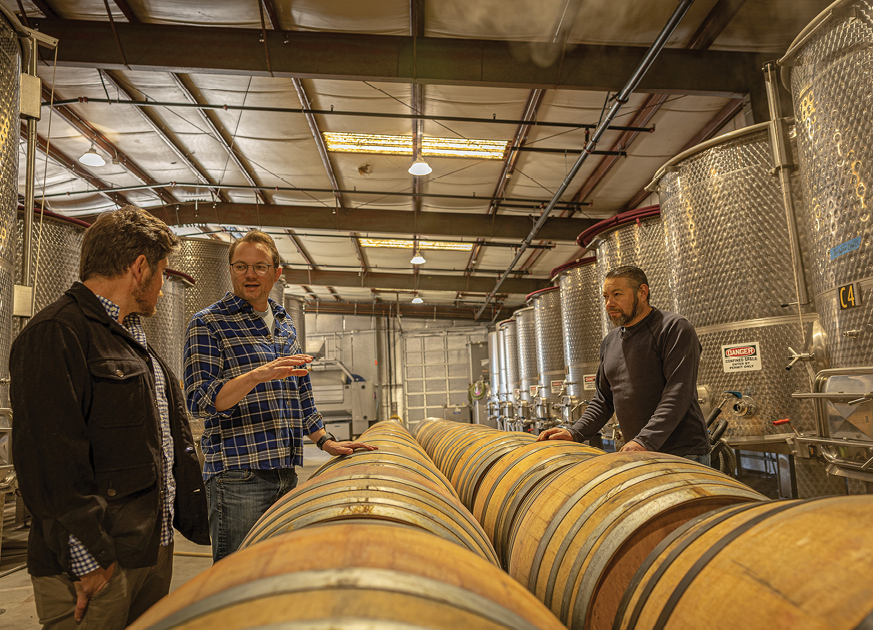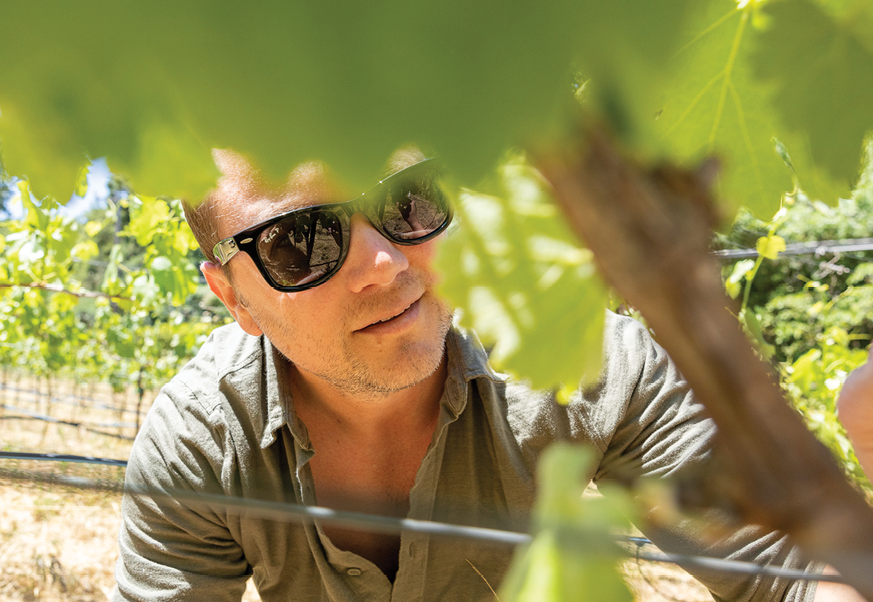- Home
- Media Kit
- MediaJet
- Current Issue
- Past Issues
- Ad Specs-Submission
- Reprints (PDF)
- Photo Specifications (PDF)
- Contact Us
- PRIVACY POLICY
- TERMS OF USE
![]()
ONLINE
![]()
ONLINE

Regenerative Farming
"Editors’ Note
Daniel Fitzgerald is a devoted winemaker who believes in creating wines that genuinely represent their origin, harmonizing elements of site, season, and heritage. His passion for fine craftsmanship, nature, and attention to detail make him a natural in vineyards and cellars. Living in Belgium for 14 years shaped Fitzgerald’s preference for delicate, lower-alcohol wines. An unexpected harvest internship led him to trade his architecture studies for winemaking, working across hemispheres before earning a bachelor’s degree in enology from CSU Fresno in 2007. Fitzgerald continued to hone his skills contributing to esteemed wineries such as Coldstream Hills, Williams Selyem, and Robert Sinskey Vineyards. Embracing his entrepreneurial spirit, Fitzgerald has gone on to own three production companies and build three wineries, all the while continuing to craft highly regarded wines. Currently, he serves as Managing Partner and Director of Winemaking for Elevation Custom Crush and AVIVO Wines.
Winery Brief
AVIVO (avivowines.com) started with a simple yet powerful idea that took root: craft exquisite, affordable wines from grape varieties that flourish in the warm Mediterranean climate. AVIVO envisioned a future where wine production not only minimized carbon emissions, but actively helped capture them, making its wines a force for positive change. AVIVO’s commitment to transparency and sustainability led it to create wines free from mysterious additives, ensuring that one can savor each glass knowing that every sip supports a healthier planet and a happier you.

AVIVO barrel room
Will you discuss your career journey?
I fell into wine production late, with a little bit of luck and no aims whatsoever of becoming a winemaker. I grew up in Belgium because of my father’s work and as such, wine was always part of the meal. Wine was generally inexpensive and meant to enhance both the quality of the food and the bon amie of the dinner table. My journey began in a dingy office in San Francisco; I had been at university for four years studying mostly architecture and had landed a job working in an architectural firm as an entry level draftsman. I sat in a chair all day and drew CAD drawings for the architects to show to their clients as needed. I hated the job and was morbidly bored. I did as many young men do in their early twenties and called my dad to complain.
My father had just moved to Healdsburg and purchased a home with a small vineyard on it. He told me that if I wanted to come help him work on the new house I could stay with him and work a harvest in wine country. I immediately accepted and two days later started as an intern at Quivira Winery in the Dry Creek Valley of Sonoma. I loved it. The work outside, meeting and working hard with interns from all over, the smells, the equipment – every day was different. The best part was seeing, smelling, and tasting the evolution of the winemaking process every day.
.png)
AVIVO wines
At the end of my first harvest, I immediately started looking for another in the Southern Hemisphere and landed at Coldstream Hills Winery in the Yarra Valley of Australia. I had even more fun and worked much harder to keep up with the 80-hour weeks they expected. Once that was done, I was back in Napa at Robert Sinskey, and then back again to Coldstream Hills. Tired out from four harvests in two years, I decided it was time to go back to school having found the career I wanted for the rest of my life. I’d never enjoyed being a student before, but for the first time flourished in my grades and the joy of learning, and three short years later I was back at work at a new job at Williams Selyem near Healdsburg, right where I had started five years before. I have since worked for many wineries and am about to start my 26th harvest. The only downside to finding something you love is that time goes by way too fast.
What was the vision for AVIVO Wines and how do you define its mission?
The vision for AVIVO really came together over three tenets:
1. Farm regeneratively: we are both CCOF and Demeter Certified, and we will leave the farmland we grow our grapes from in better shape for the next generation.
2. Quality wine can be made naturally, be widely delicious and stable for long-term aging – so let’s make it that way.
3. Location and grape varieties matter. The majority of California and where we grow is a Mediterranean climate. Let’s grow varieties that will thrive and be the best versions of themselves for quality winemaking. It costs less to farm them, it lowers our carbon emissions to farm those varieties, and they are naturally balanced to make great wine.

Dan Fitzgerald in the vineyards
Will you provide an overview of AVIVO Wines’ offerings?
We make a red wine that is mostly Sangiovese with a little Syrah for mid-palate texture. Our white is mostly Vermentino which rocks with a little Moscato for added phenolics and some Albariño for its excellent acidity. Our Rosé is made from Sangiovese and picked for rosé winemaking – we do not use bleed. We pick it about three weeks before we begin harvesting Sangiovese for red wine making and press its whole cluster to preserve aromatics and acidity.
Will you discuss your views on the importance of regenerative farming?
This is a core tenet of ours. One hundred and 20 years ago, before World War I, regenerative farming was simply called farming. We’re not reinventing the wheel; we’re returning to practices that have always worked. The two world wars brought famine and rapid advances in agriculture and microbiology. These innovations helped feed growing populations, but over time, our dependence on conventional farming practices – including chemical inputs, monocultures, and extractive techniques – have contributed to soil degradation, carbon emissions, and broader environmental challenges.
Much of modern-day viticulture now relies on practices that are carbon-emissive and additive-heavy. But there is a better way. By planting native, proven grape varieties and committing to long-term regenerative farming, we can rebuild soil health, sequester carbon, and create a healthier, more sustainable future. Returning to these foundational methods allows us to produce food and wine that are more nutritious, safer, and better for both people and the planet.
.jpg)
AVIVO wine served with a meal
Will you discuss AVIVO Wines’ commitment to sustainability?
We are committed to showing our industry that we can produce wine at scale that is delicious, natural, and sequesters carbon, while still turning a profit. We intend to make our financials public once we have all the data.
What has made the wine industry so special for you?
I love this industry because it’s part science, part intuition, and part art and, even when you think you’ve figured something out, you can never replicate it exactly. Every day at work is different. I work with farmers, chemists, engineers, marketers, sales people, and even the occasional celebrity. There is no right or wrong – everyone has a different opinion that matters about every wine I make. Luckily, it’s almost always a nice one. Seeing someone enjoy something I’ve crafted never gets old. I get a deep sense of accomplishment when I see people enjoying my wines over lively discussions and delicious meals. After all, wine is so much more than a beverage; it’s been bringing people together for thousands of years.![]()